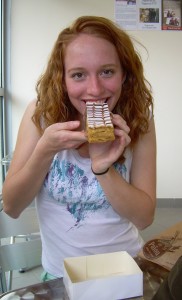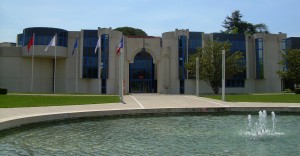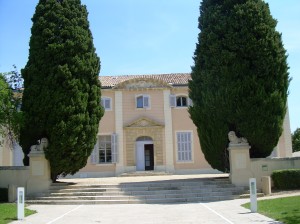Bonjour! Greetings from the gorgeous south of France! I am currently in the city of Montpellier studying at SupAgro University, an International Center for Higher Education in Agricultural Sciences. The plan is to immerse myself here for two weeks in value-added agriculture, known here as valeur differentes,through agro-tourism, and then spend the remainder of my summer at an olive farm called the Domaine de l’Oulivie. This is a definite hands-on learning experience as I will have a chance to meet individuals from the government position, from the research stance, and get a chance to meet and work with the producers themselves.
So far, I am a week into this adventure and I’ve decided I am definitely in love with this area and its food. A friend from home dared me to attempt at least two new foods. I have had pickled seaweed and pork pate so far, in addition to numerous cheeses, some delicious and some rather rancid in my opinion, but French desserts have totally become my obsession.
Anyway, as this is more of an academic blog rather than my personal food blog, or at least is supposed to be…I will discuss our first adventure, which was a meeting with Jean-Francois Pouget, Director of marketing and communication of Herault tourisme.
Apparently after the French Revolution, a strong central government movement formed Departments, but this was later modernized to a system of Regions and Departments within France that are engaged in what appears to be a continual struggle somewhat like our Federal vs. State power issue (Thank you Food Law for a fabulous background of this!) In France, from a political standpoint, agriculture and tourism is covered by both the Department and the Region, and today we learned about the association within/of the Department that deals specifically with Herault tourisme. This concept is embodied in the fact that the French society has changed-going from traditional farmers to the point where people live in towns and cities and only 3% remain as farmers. Herault tourismeis a way to capitalize on the movement to reconnect with food. French people have a desire to visit the countryside on their weekends off, and instead of going to the beach, they want to have an experience with their food and the people that produce it in the natural setting. This desire happens to be fantastic for the farmers from a value added sense because now they not only produce a product, but are able to market their way of life by visits and tours. The Department helps by providing funds to farmers and advice on marketing, while making political decisions and regulations from statistics on how to best preserve the countryside despite development for economic purposes. This is a really interesting concept cited in one of our readings as “re-embedding”, or blending ecological concepts into economic rationalities (Marsden 2004). Overall, the Herault tourisme Association/Department’s role reminded me in some parts of Cornell Cooperative Extension as their door is open for any farmer, but it also assumes some EPA-like power, and of course seems to have much more funding. 
It is completely possible for me to see why tourism is able to entwine itself with agriculture so well here because this area was literally built by wine. The beautiful buildings in the middle of the city-many built in the 8th century were financially feasible because of the wine production. This trend has persisted ever since then, below is a picture of a villa built from the riches from the wine trade in the 19th century. It sits in the middle of the Department buildings,pictured to the right, and serves to depict the history of the deep roots and development of the country.
We are scheduled to tour two wineries in the Pic Saint Loup region next (providing we survive the drive…did I mention it’s impossible to find a car here that doesn’t have a least one major dent and several scrapes?) Until next time- a bientot!


The dessert looks amazing and I want a bite! Can’t wait to hear and see where you will go next!
Welcome to Montpel! Hope you learn about the anarchist wine makers on your tour, they’re a crazy bunch.